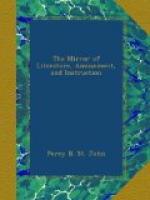“Farther reading and thinking, though they brought this vague inclination into more reasonable bounds, only served to make it more decided. I visited various parts of my own country; and had I been merely influenced by a love of fine scenery, I should have felt little desire to seek elsewhere its gratification; for on no country have the charms of nature been more prodigally lavished. Her mighty lakes, like oceans of liquid silver; her mountains, with their bright aerial tints; her valleys, teeming with wild fertility; her tremendous cataracts, thundering in their solitudes; her boundless plains, waving with spontaneous verdure; her broad, deep rivers, rolling in solemn silence to the ocean; her trackless forests, where vegetation puts forth all its magnificence; her skies, kindling with the magic of summer clouds and glorious sunshine:—no, never need an American look beyond his own country for the sublime and beautiful of natural scenery."[2]
[Footnote 2: Sketch Book, vol. i.]
Mr. Irving began his career, as an author, in periodical literature. His first work was a humorous journal, entitled “Salmagundi, or the Whim-Whams and Opinions of Launcelot Langstaff, Esq. and Others,” originally published in numbers in New York, where it met with a very flattering reception. The date of the first paper is Saturday, January 24, 1827.
Salmagundi has been several times reprinted in this country; and it may be acceptable to know, that the cheapest, if not the most elegant, edition may be purchased for twenty-pence. It would be difficult to explain the merits of Salmagundi to the reader, as they are of the most varied character; but, it may be remarked generally, that a vein of quaint humour and human kindness pervades these early papers, which will bring the reader and writer to the best possible terms.
This lively miscellany was followed by a humorous History of New York, with the somewhat droll nom of Dedrick Knickerbocker as its author. It possesses considerable merit, with a nice perception of the ludicrous; but, on its first appearance, this recommendation was generally overlooked, whether from the local interest of the subject, or the want of due judgment in its readers, it is difficult to determine.
About this period Mr. Irvine’s name was heard in England, almost for the first time; his only claims to public notice resting entirely on Salmagundi, and the History of New York. He was indebted for his introduction to the acquaintance of European readers, to a young fellow-countryman of high attainments, who alludes to the above works and their author in the following terms:—“Mr. Irving has shown much talent and great humour in his Salmagundi and Knickerbocker, and they are exceedingly pleasant books, especially to one who understands the local allusions.”




